中英语语法反意疑问句归纳总结
中考英语语法考点知识复习_反义疑问句
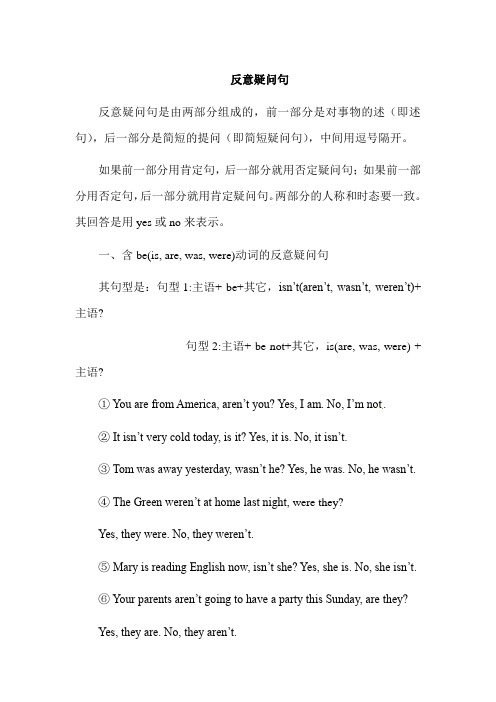
反意疑问句反意疑问句是由两部分组成的,前一部分是对事物的述(即述句),后一部分是简短的提问(即简短疑问句),中间用逗号隔开。
如果前一部分用肯定句,后一部分就用否定疑问句;如果前一部分用否定句,后一部分就用肯定疑问句。
两部分的人称和时态要一致。
其回答是用yes或no来表示。
一、含be(is, are, was, were)动词的反意疑问句其句型是:句型1:主语+ be+其它,isn’t(aren’t, wasn’t, weren’t)+ 主语?句型2:主语+ be not+其它,is(are, was, were) + 主语?① You are from America, aren’t you? Yes, I am. No, I’m not.② It isn’t very cold today, is it? Yes, it is. No, it isn’t.③ Tom was away yesterday, wasn’t he? Yes, he was. No, he wasn’t.④ The Green weren’t at home last night, were they?Yes, they were. No, they weren’t.⑤ Mary is reading English now, isn’t she? Yes, she is. No, she isn’t.⑥ Your parents aren’t going to have a party this Sunday, are they?Yes, they are. No, they aren’t.⑦ The girls were singing when the teacher came in, weren’t they?Yes, they were. No, they weren’t.注意:There be句型① There is an old picture on the wall, isn’t there?Yes, there is. No, there isn’t.② There aren’t any children in the room, are there?Yes, there are. No, there aren’t.③ There wasn’t a telephone call for me, was there?Yes, there was. No, there wasn’t.④ There were enough people to pick apples, weren’t there?Yes, there were. No there weren’t.二、行为动词的一般现在时的反意疑问句其句型是:句型1: 主语+动词原形+其它,don’t I(you, we, they)?句型2: 主语+ don’t+动词原形+其它,do I(you, we, they)?句型3: 主语+动词第三人称单数+其它,doesn’t he(she, it)?句型4: 主语+ doesn’t+动词原形+其它,doeshe(she, it)?① You often watch TV in the evening, don’t you? Yes, I do. No, I don’t.② The students don’t study hard, do they? Yes, they do. No, they don’t.③ Mary studies Chinese hard, doesn’t she? Yes, she does. No, she doesn’t.④ The boy doesn’t often go to school by bike, does he?Yes, he does. No, he doe sn’t.⑤The first class begins at eight, doesn’t it? Yes, it does. No, it doesn’t.三、行为动词的一般过去时的反意疑问句其句型是:句型1: 主语+动词过去式+其它,didn’t+主语?句型2: 主语+didn’t+动词原形+其它,did +主语?① You watched TV last night, didn’t you? Yes, I did. No, I didn’t.② Ji m’s parents didn’t go to Hong Kong last month, did they?Yes, they did. No, they didn’t.③ The rain stopped, didn’t it? Yes, it did. No, it didn’t.④Mr. Clarke didn’t buy a car, didn’t he? Yes, he did. No, he didn’t.四、一般将来时的反意疑问句其句型是:句型1: 主语+will+动词原形+其它,won’t+主语?句型2: 主语+ won’t +动词原形+其它,will +主语?①The boys will play games, won’t they? Yes, they will. No, they won’t.② It won’t stop raining, will it? Yes, it will. No, it won’t.③ Mr. Smith will visit our school next week, won’t he? Yes, he will. No, he won’t.注意:There be句型的一般将来时① There will be a basketball match tomorrow, won’t there?Yes, there will. No, there won’t.② There won’t be too much pollution in the future, will there?Yes, there will. No, there won’t.五、现在完成时的反意疑问句其句型是:句型1: 主语+have+动词过去分词+其它,haven’t+主语?句型2: 主语+ haven’t +动词过去分词+其它,have +主语?句型3: 主语+has+动词过去分词+其它,hasn’t+主语?句型4: 主语+ hasn’t +动词过去分词+其它,has +主语?① You have been to Shanghai before, h aven’t you? Yes I have. No, I haven’t.② You haven’t been to Shanghai before, have you? Yes I have. No, I haven’t.③Jack has done his homework, hasn’t he? Yes, he has. No, he hasn’t.④Jack hasn’t done his homework, has he? Yes, he has. No, he hasn’t.六、现在完成进行时的反意疑问句其句型是:句型1: 主语+have been+动词现在分词+其它,haven’t+主语?句型2: 主语+ haven’t been +动词现在分词+其它,have +主语?句型3: 主语+has been +动词现在分词+其它,hasn’t+主语?句型4: 主语+ hasn’t been +动词现在分词+其它,has +主语?① You have been skating for five hours, h aven’t you? Yes, I have. No, I haven’t.② You haven’t been skating for five hours, have you? Yes, I have. No, I haven’t.③ Bob has been collecting kites since 1999, hasn’t he? Yes, he has. No, he hasn’t.④ Bob hasn’t been collecting kites since 1999, has h e? Yes, he has. No, he hasn’t.七、含有情态动词的反意疑问句其句型是:句型1: 主语+情态动词+动词原形+其它,情态动词否定形式+主语?句型2: 主语+情态动词否定形式+动词原形+其它,情态动词+主语?① You can speak French, can’t you? Yes, I can. No, I can’t.②They can’t understand me, can they? Yes, they can. No, they can’t.③ Ann could swim when she was six, couldn’t she? Yes, she could. No, she couldn’t.④ The students must study hard, mustn’t they? Yes, they must. No, they needn’t.注意:You must go home now, needn’t you? Yes, I must. No, I needn’t.★值得注意的是有时英语的谓语动词并不用否定式(即没加上not),而是用上了“never, little, few, hardly, nothing, nobody”等词,这时该述句也属于否定句,因此,反意疑问句的后半部分应用肯定疑问式。
(完整版)初中英语反义疑问句的用法归纳

反义疑问句It looks like rain, doesn’t it?He doesn’t need to work so late, does he?This is a dictionary, isn’t it?Those are shelves, aren’t they?There once was a man named Saint Nicholas, wasn’t there?I am very interested in learning English, aren’t I?4)陈述句的主语是动词不定式,动词的-ing形式或从句时,疑问部分的主语多用it来体现。
如:Taking care of our environment is very important, isn’t it?What he said is right, isn’t it?5)陈述句中含有not, no, hardly, neither, never, few, little, too …to等否定词或具有否定意义的词时,疑问部分常用肯定形式。
如:Few people knew the news, did they?Tom has never been to England , has he?She is unhappy, isn’t she?No one knows him, do they?Someone is waiting for you, isn’t he?Nobody says a word about the accident, do they?Everything seems all right, doesn’t it?7)陈述句是主从复合句时,如果主句的谓语动词是think, believe, expect, feel, guess等词,且主语是第一人称I或we时,反意疑问部分的人称、时态与宾语从句保持一致,同时还要考虑到否定的转移(否定前移)。
九年义务初中英语反义疑问句知识点总结归纳
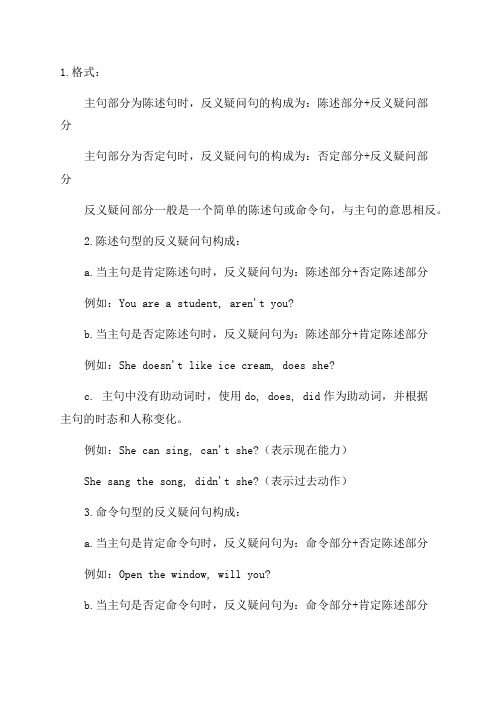
1.格式:
主句部分为陈述句时,反义疑问句的构成为:陈述部分+反义疑问部
分
主句部分为否定句时,反义疑问句的构成为:否定部分+反义疑问部
分
反义疑问部分一般是一个简单的陈述句或命令句,与主句的意思相反。
2.陈述句型的反义疑问句构成:
a.当主句是肯定陈述句时,反义疑问句为:陈述部分+否定陈述部分
例如:You are a student, aren't you?
b.当主句是否定陈述句时,反义疑问句为:陈述部分+肯定陈述部分
例如:She doesn't like ice cream, does she?
c. 主句中没有助动词时,使用do, does, did作为助动词,并根据
主句的时态和人称变化。
例如:She can sing, can't she?(表示现在能力)
She sang the song, didn't she?(表示过去动作)
3.命令句型的反义疑问句构成:
a.当主句是肯定命令句时,反义疑问句为:命令部分+否定陈述部分
例如:Open the window, will you?
b.当主句是否定命令句时,反义疑问句为:命令部分+肯定陈述部分
例如:Don't be late, will you?
4.意义和作用:
a.反义疑问句常用来征求对方的同意、确认或提出建议。
b.反义疑问句的答案通常是肯定或否定的形式,但与主句相反。
c.反义疑问句的语调通常是上扬的,表示疑问或请求。
总的来说,九年义务初中英语反义疑问句是一种表达疑问和确认的语法形式,掌握了这一知识点有助于提高英语交流的准确性和流利度。
英语语法总结反义疑问句
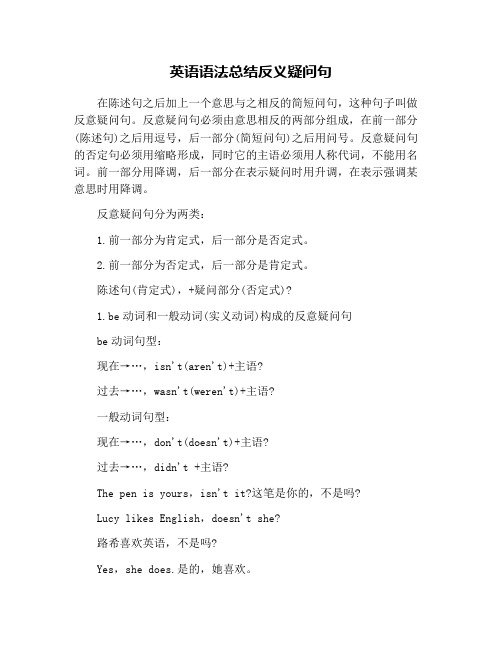
英语语法总结反义疑问句在陈述句之后加上一个意思与之相反的简短问句,这种句子叫做反意疑问句。
反意疑问句必须由意思相反的两部分组成,在前一部分(陈述句)之后用逗号,后一部分(简短问句)之后用问号。
反意疑问句的否定句必须用缩略形成,同时它的主语必须用人称代词,不能用名词。
前一部分用降调,后一部分在表示疑问时用升调,在表示强调某意思时用降调。
反意疑问句分为两类:1.前一部分为肯定式,后一部分是否定式。
2.前一部分为否定式,后一部分是肯定式。
陈述句(肯定式),+疑问部分(否定式)?1.be动词和一般动词(实义动词)构成的反意疑问句be动词句型:现在→…,isn't(aren't)+主语?过去→…,wasn't(weren't)+主语?一般动词句型:现在→…,don't(doesn't)+主语?过去→…,didn't +主语?The pen is yours,isn't it?这笔是你的,不是吗?Lucy likes English,doesn't she?路希喜欢英语,不是吗?Yes,she does.是的,她喜欢。
No,she doesn't.不,她不喜欢。
That was a wonderful night,wasn't it?那是个奇妙的夜晚,不是吗?Yes,it was.是的,它是。
No,it wasn't.不,它不是。
Your sister helped him,didn't she?你姐姐协助了他,不是吗?Yes,she did.是的。
她协助他。
No,she didn't.不。
她没有协助他。
注意反意疑问句中,前后两部分的动词在人称、数和时态上通常保持一致。
另外后一部分的人称代词应和前一部分的主语(名词或代词)保持一致。
Tom is skating,isn't he?(实行时)汤姆在滑冰,不是吗?Yes,he is.是的。
初中英语语法反意疑问句知识点总结

初中英语语法反意疑问句知识点总结初中英语语法反意疑问句知识点总结 反意疑问句 1) 陈述部分的.主语是I,疑问部分要⽤ aren't I. I'm as tall as your sister,aren't I? 2) 陈述部分的谓语是wish,疑问部分要⽤may +主语。
I wish to have a word with you, may I? 3) 陈述部分⽤ no, nothing, nobody, never, few, seldom, hardly, rarely, little等否定含义的词时,疑问部分⽤肯定含义。
The Swede made no answer, did he / she? Some plants never blown (开花), do they ? 4) 含有ought to 的反意疑问句,陈述部分是肯定的,疑问部分⽤shouldn't / oughtn't +主语。
He ought to know what to do, oughtn't he? / shouldn't he? 5) 陈述部分有have to +v. (had to + v.),疑问部分常⽤don't +主语(didn't +主语)。
We have to get there at eight tomorrow, don't we? 6) 陈述部分的谓语是used to 时,疑问部分⽤didn't +主语或 usedn't +主语。
He used to take pictures there, didn't he? / usedn't he? 7) 陈述部分有had better + v. 疑问句部分⽤hadn't you? You'd better read it by yourself, hadn't you? 8) 陈述部分有would rather +v.,疑问部分多⽤ wouldn't +主语。
初中英语语法总结:反义疑问句
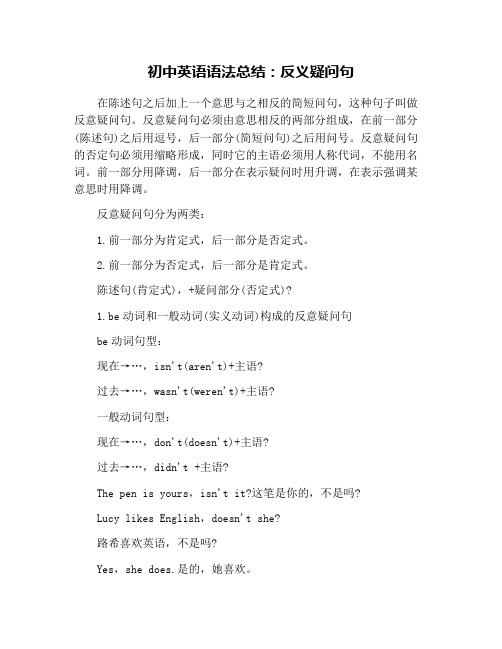
初中英语语法总结:反义疑问句在陈述句之后加上一个意思与之相反的简短问句,这种句子叫做反意疑问句。
反意疑问句必须由意思相反的两部分组成,在前一部分(陈述句)之后用逗号,后一部分(简短问句)之后用问号。
反意疑问句的否定句必须用缩略形成,同时它的主语必须用人称代词,不能用名词。
前一部分用降调,后一部分在表示疑问时用升调,在表示强调某意思时用降调。
反意疑问句分为两类:1.前一部分为肯定式,后一部分是否定式。
2.前一部分为否定式,后一部分是肯定式。
陈述句(肯定式),+疑问部分(否定式)?1.be动词和一般动词(实义动词)构成的反意疑问句be动词句型:现在→…,isn't(aren't)+主语?过去→…,wasn't(weren't)+主语?一般动词句型:现在→…,don't(doesn't)+主语?过去→…,didn't +主语?The pen is yours,isn't it?这笔是你的,不是吗?Lucy likes English,doesn't she?路希喜欢英语,不是吗?Yes,she does.是的,她喜欢。
No,she doesn't.不,她不喜欢。
That was a wonderful night,wasn't it?那是个奇妙的夜晚,不是吗?Yes,it was.是的,它是。
No,it wasn't.不,它不是。
Your sister helped him,didn't she?你姐姐协助了他,不是吗?Yes,she did.是的。
她协助他。
No,she didn't.不。
她没有协助他。
注意反意疑问句中,前后两部分的动词在人称、数和时态上通常保持一致。
另外后一部分的人称代词应和前一部分的主语(名词或代词)保持一致。
Tom is skating,isn't he?(实行时)汤姆在滑冰,不是吗?Yes,he is.是的。
中小学英语语法(反义疑问句)
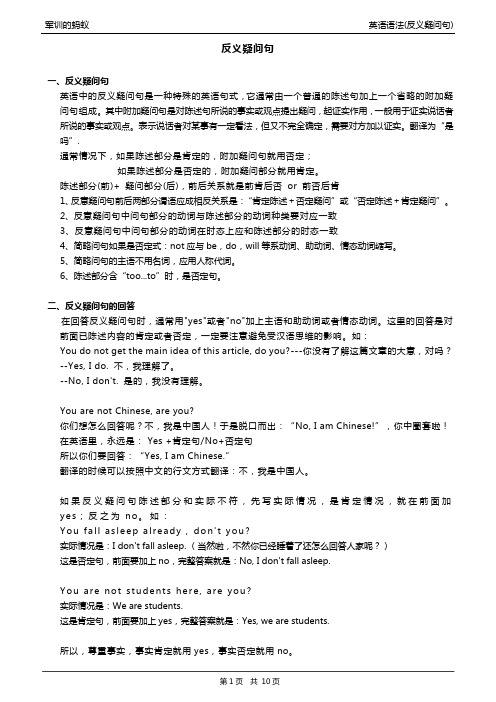
反义疑问句一、反义疑问句英语中的反义疑问句是一种特殊的英语句式,它通常由一个普通的陈述句加上一个省略的附加疑问句组成。
其中附加疑问句是对陈述句所说的事实或观点提出疑问,起证实作用,一般用于证实说话者所说的事实或观点。
表示说话者对某事有一定看法,但又不完全确定,需要对方加以证实。
翻译为“是吗”.通常情况下,如果陈述部分是肯定的,附加疑问句就用否定;如果陈述部分是否定的,附加疑问部分就用肯定。
陈述部分(前)+ 疑问部分(后),前后关系就是前肯后否or 前否后肯1、反意疑问句前后两部分谓语应成相反关系是:“肯定陈述+否定疑问”或“否定陈述+肯定疑问”。
2、反意疑问句中问句部分的动词与陈述部分的动词种类要对应一致3、反意疑问句中问句部分的动词在时态上应和陈述部分的时态一致4、简略问句如果是否定式:not应与be,do,will等系动词、助动词、情态动词缩写。
5、简略问句的主语不用名词,应用人称代词。
6、陈述部分含“too...to”时,是否定句。
二、反义疑问句的回答在回答反义疑问句时,通常用"yes"或者"no"加上主语和助动词或者情态动词。
这里的回答是对前面已陈述内容的肯定或者否定,一定要注意避免受汉语思维的影响。
如:You do not get the main idea of this article, do you?---你没有了解这篇文章的大意,对吗?--Yes, I do. 不,我理解了。
--No, I don't. 是的,我没有理解。
You are not Chinese, are you?你们想怎么回答呢?不,我是中国人!于是脱口而出:“No, I am Chinese!”,你中圈套啦!在英语里,永远是: Yes +肯定句/No+否定句所以你们要回答:“Yes, I am Chinese.”翻译的时候可以按照中文的行文方式翻译:不,我是中国人。
初中英语语法学习知识点归纳之反义疑问句
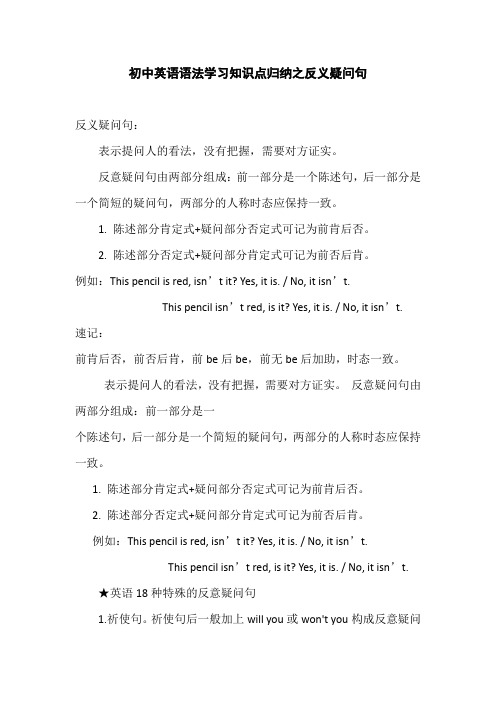
初中英语语法学习知识点归纳之反义疑问句反义疑问句:表示提问人的看法,没有把握,需要对方证实。
反意疑问句由两部分组成:前一部分是一个陈述句,后一部分是一个简短的疑问句,两部分的人称时态应保持一致。
1. 陈述部分肯定式+疑问部分否定式可记为前肯后否。
2. 陈述部分否定式+疑问部分肯定式可记为前否后肯。
例如:This pencil is red, isn’t it? Yes, it is. / No, it isn’t.This pencil isn’t red, is it? Yes, it is. / No, it isn’t.速记:前肯后否,前否后肯,前be后be,前无be后加助,时态一致。
表示提问人的看法,没有把握,需要对方证实。
反意疑问句由两部分组成:前一部分是一个陈述句,后一部分是一个简短的疑问句,两部分的人称时态应保持一致。
1. 陈述部分肯定式+疑问部分否定式可记为前肯后否。
2. 陈述部分否定式+疑问部分肯定式可记为前否后肯。
例如:This pencil is red, isn’t it? Yes, it is. / No, it isn’t.This pencil isn’t red, is it? Yes, it is. / No, it isn’t.★英语18种特殊的反意疑问句1.祈使句。
祈使句后一般加上will you或won't you构成反意疑问句,用will you 多表示“请求”,用won't you 多表示提醒对方注意。
例如:Look at the blackboard, will you/ won't you?看黑板,好吗?Let 引导的祈使句有两种情况:1) Let's...后的反意疑问句用shall we或shan't we。
例如:Let's go home, shall we/ shan't we? 回家吧,好吗?还可以用may I来表示征求对方的同意或许可。
- 1、下载文档前请自行甄别文档内容的完整性,平台不提供额外的编辑、内容补充、找答案等附加服务。
- 2、"仅部分预览"的文档,不可在线预览部分如存在完整性等问题,可反馈申请退款(可完整预览的文档不适用该条件!)。
- 3、如文档侵犯您的权益,请联系客服反馈,我们会尽快为您处理(人工客服工作时间:9:00-18:30)。
中英语语法反意疑问句反意疑问句是由两部分组成的,前一部分是对事物的陈述(即陈述句),后一部分是简短的提问(即简短疑问句),中间用逗号隔开。
如果前一部分用肯定句,后一部分就用否定疑问句;如果前一部分用否定句,后一部分就用肯定疑问句。
两部分的人称和时态要一致。
其回答是用yes或no来表示。
一、含be(is, are, was, were)动词的反意疑问句其句型是:句型1:主语+ be+其它,isn’t(aren’t, wasn’t, weren’t)+ 主语?句型2:主语+ be not+其它,is(are, was, were) + 主语?① You are from America, aren’t you? Yes, I am. No, I’m not.② It isn’t very cold today, is it? Yes, it is. No, it isn’t.③ Tom was away yesterday, wasn’t he? Yes, he was. No, he wasn’t.④ The Green weren’t at home last night, were they? Yes, they were. No, they weren’t.⑤ Mary is reading English now, isn’t she? Yes, she is. No, she isn’t.⑥ Your parents aren’t going to have a party this Sunday, are they?Yes, they are. No, they aren’t.⑦ The girls were singing when the teacher came in, weren’t they?Yes, they were. No, they weren’t.注意:There be句型① There is an old picture on the wall, isn’t there?Yes, there is. No, there isn’t.② There aren’t any children in the room, are there?Yes, there are. No, there aren’t.③ There wasn’t a telephone call for me, was there?Yes, there was. No, there wasn’t.④ There were enough people to pick apples, weren’t there?Yes, there were. No there weren’t.二、行为动词的一般现在时的反意疑问句其句型是:句型1: 主语+动词原形+其它,don’t I(you, we, they)?句型2: 主语+ don’t+动词原形+其它,do I(you, we, they)?句型3: 主语+动词第三人称单数+其它,doesn’t he(she, it)?句型4: 主语+ doesn’t+动词原形+其它,does he(she, it)?① You often watch TV in the evening, don’t you? Yes, I do. No, I don’t.② The students don’t study hard, do they? Yes, they do. No, they don’t.③ Mary studies Chinese hard, doesn’t she? Yes, she does. No, she doesn’t.④ The boy doesn’t often go to school by bike, does he?Yes, he does. No, he doesn’t.⑤ The first class begins at eight, doesn’t it? Yes, it does. No, it doesn’t.三、行为动词的一般过去时的反意疑问句其句型是:句型1: 主语+动词过去式+其它,didn’t+主语?句型2: 主语+didn’t+动词原形+其它,did +主语?① You watched TV last night, didn’t you? Yes, I did. No, I didn’t.② Jim’s parents didn’t go to Hong Kong last month, did they?Yes, they did. No, they didn’t.③ The rain stopped, didn’t it? Yes, it did. No, it didn’t.④ Mr. Clarke didn’t buy a car, didn’t he? Yes, he did. No, he didn’t.四、一般将来时的反意疑问句其句型是:句型1: 主语+will+动词原形+其它,won’t+主语?句型2: 主语+ won’t +动词原形+其它,will +主语?① The boys will play games, won’t they? Yes, they will. No, they won’t.② It won’t stop raining, will it? Yes, it will. No, it won’t.③ Mr. Smith will visit our school next week, won’t he? Yes, he will. No, he won’t.注意:There be句型的一般将来时① There will be a basketball match tomorrow, won’t there?Yes, there will. No, there won’t.② There won’t be too much pollution in the future, will there?Yes, there will. No, there won’t.五、现在完成时的反意疑问句其句型是:句型1: 主语+have+动词过去分词+其它,haven’t+主语?句型2: 主语+ haven’t +动词过去分词+其它,have +主语?句型3: 主语+has+动词过去分词+其它,hasn’t+主语?句型4: 主语+ hasn’t +动词过去分词+其它,has +主语?① You have been to Shanghai before, haven’t you? Yes I have. No, I haven’t.② You haven’t been to Shanghai before, have you? Yes I have. No, I haven’t.③ Jack has done his homework, hasn’t he? Yes, he has. No, he hasn’t.④ Jack hasn’t done his homework, has he? Yes, he has. No, he hasn’t.六、现在完成进行时的反意疑问句其句型是:句型1: 主语+have been+动词现在分词+其它,haven’t+主语?句型2: 主语+ haven’t been +动词现在分词+其它,have +主语?句型3: 主语+has been +动词现在分词+其它,hasn’t+主语?句型4: 主语+ hasn’t been +动词现在分词+其它,has +主语?① You have been skating for five hours, haven’t you? Yes, I have. No, I haven’t.② You haven’t been skating for five hours, have you? Yes, I have. No, I haven’t.③ Bob has been collecting kites since 1999, hasn’t he? Yes, he has. No, he hasn’t.④ Bob hasn’t been collecting kites since 1999, has he? Yes, he has. No, he hasn’t.七、含有情态动词的反意疑问句其句型是:句型1: 主语+情态动词+动词原形+其它,情态动词否定形式+主语?句型2: 主语+情态动词否定形式+动词原形+其它,情态动词+主语?① You can speak French, can’t you? Yes, I can. No, I can’t.② They can’t understand me, can they? Yes, they can. No, they can’t.③ Ann could swim when she was six, couldn’t she? Yes, she could. No, she couldn’t.④ The students must study hard, mustn’t they? Yes, they must. No, they needn’t.注意:You must go home now, needn’t you? Yes, I must. No, I needn’t.★值得注意的是有时英语的谓语动词并不用否定式(即没加上not),而是用上了“never, little, few, hardly, nothing, nobody”等词,这时该陈述句也属于否定句,因此,反意疑问句的后半部分应用肯定疑问式。
① You have never been to Beijing, have you? Yes, I have. No, I haven’t.② Mr. Fat has few friends here, does he? Yes, he does. No, he doesn’t.③ There is little milk in the bottle, is there? Yes, there is. No, there isn’t.④ He could do nothing, could he? Yes, he could. No, he couldn’t.八、祈使句用于反意疑问句中这种类型较特殊,前一部分是祈使句,后一部分是肯定疑问形式。
